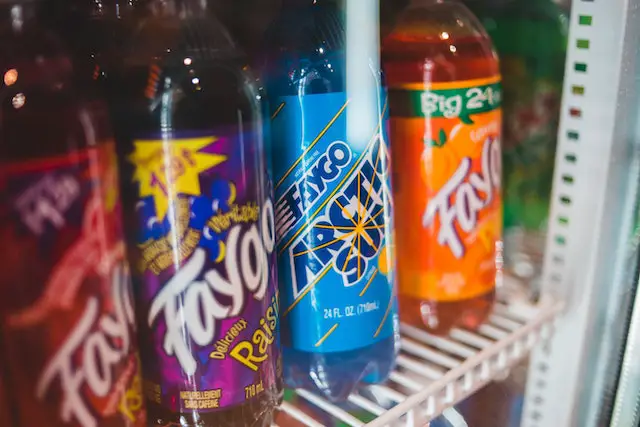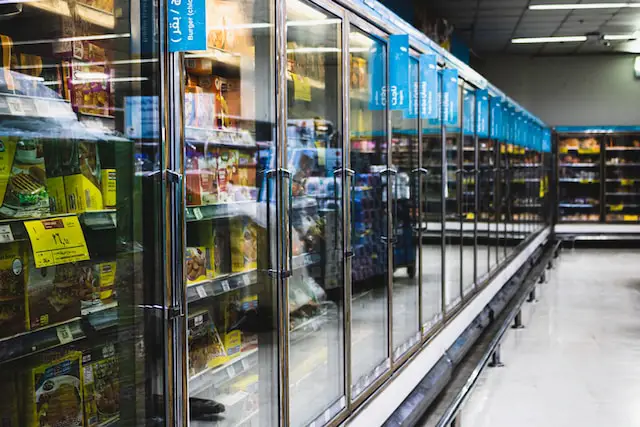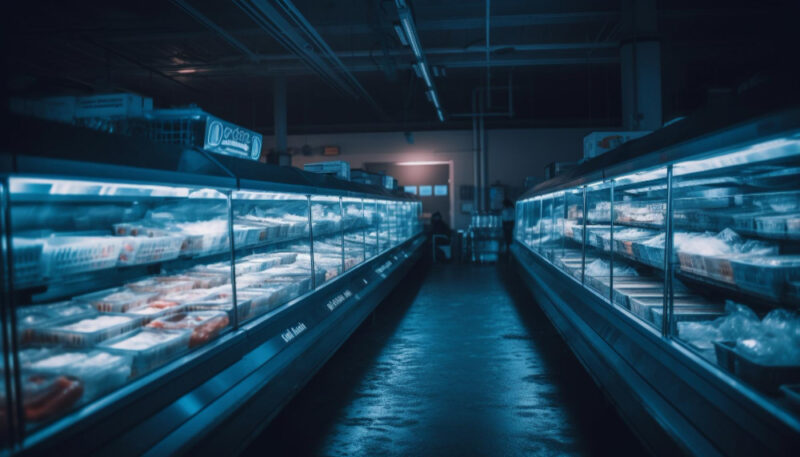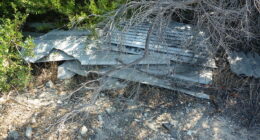A commercial chiller helps to keep perishable items cool and fresh, a commercial freezer is designed to freeze products and extend their shelf life.
TL;DR Commercial chiller Vs. Commercial freezer
A chiller typically maintains temperatures between 0°C to 4°C (32°F to 39°F) and is used to cool perishable items,
A freezer operates at much lower temperatures, usually between -18°C to -24°C (0°F to -11°F), and is used to freeze and preserve food for extended periods.
Chillers are suitable for short-term storage and maintaining freshness, while freezers are ideal for long-term storage and bulk freezing of items.
What is a commercial chiller?

A commercial chiller is a refrigeration unit designed to maintain low temperatures in order to keep perishable items cool. It plays a crucial role in various industries, including food service, hospitality, pharmaceuticals, and more.
Commercial chillers work by circulating chilled air or water through the unit to remove heat from the stored items. These units are typically larger and more powerful than their residential counterparts. They come in different shapes and sizes depending on the specific needs of the business.
What is a commercial freezer?

A commercial freezer designed to store and preserve perishable goods at extremely low temperatures, typically below 0 degrees Fahrenheit (-18 degrees Celsius).
This freezing temperature helps to slow down the growth of bacteria and other microorganisms, keeping food fresh for a longer period.
Unlike a regular household freezer, a commercial freezer is much larger in size and has a higher storage capacity. It usually comes with multiple compartments or shelves, allowing for better organization and easy access to different types of frozen items.
Commercial chiller Vs. Commercial freezer – Key differences
| Feature | Commercial Chiller | Commercial Freezer |
|---|---|---|
| Purpose | Cooling food items to low temperatures | Freezing food items to very low temperatures |
| Temperature Range | Typically 0°C to 4°C (32°F to 39°F) | Typically -18°C to -24°C (0°F to -11°F) |
| Food Preservation | Extends shelf life and maintains freshness | Preserves food for long-term storage |
| Suitable for | Keeping perishable items like vegetables, meats, etc. | Storing frozen foods like meats, ice cream, prepared meals |
| Cooling Method | Uses refrigeration to remove heat | Uses refrigeration and insulation to freeze items |
| Versatility | Limited to cooling temperatures | Can be used for both cooling and freezing temperatures |
| Time for Food Preparation | Keeps food fresh for a short period | Allows bulk preparation and storage for extended periods |
| Energy Consumption | Generally consumes less energy than a freezer | Typically consumes more energy due to lower temperatures |
| Food Texture | Preserves food texture, taste, and quality | May affect texture and quality depending on the item |
| Inventory Management | Suitable for short-term storage and quick access | Ideal for long-term storage and bulk buying |
| Application | Restaurants, supermarkets, display units | Restaurants, hotels, food processing, bulk storage |
The benefits of using a commercial chiller
- Food Preservation: Commercial chillers effectively lower the temperature of food products, helping to preserve their freshness and extend their shelf life.
- Temperature Control: Commercial chillers offer precise temperature control, allowing businesses to store different types of perishable goods at optimal temperatures.
- Energy Efficiency: Many modern commercial chillers are designed to be energy-efficient, helping businesses save on utility costs while maintaining proper cooling temperatures.
- Increased Productivity: With a well-organized commercial chiller, kitchen staff can easily access ingredients, reducing the time spent searching for items and improving overall kitchen efficiency.
- Food Safety Compliance: Commercial chillers are built to meet health and safety regulations, ensuring that businesses comply with food safety standards and avoid potential legal issues.
- Bulk Storage: Commercial chillers provide ample storage space, allowing businesses to buy perishable goods in bulk, which can lead to cost savings and reduced supply chain disruptions.
- Customizable Options: Commercial chillers come in various sizes and configurations, offering businesses the flexibility to choose a unit that best suits their needs and available space.
- Display and Merchandising: Some commercial chillers are designed with glass doors or open displays, allowing businesses to showcase their products attractively and encourage impulse buying.
- Noise Reduction: Modern commercial chillers often come with noise reduction features, creating a quieter and more comfortable environment for employees and customers.
- Improved Food Quality: By maintaining proper temperatures, commercial chillers help preserve the texture, taste, and nutritional value of food products, ensuring that customers receive high-quality dishes.
Investing in a commercial chiller can lead to improved food safety, reduced waste, enhanced efficiency, and increased customer satisfaction.
The benefits of using a commercial freezer
- Food Preservation: Commercial freezers maintain consistently low temperatures, allowing businesses to store perishable items for an extended period.
- Extended Shelf Life: By slowing down the deterioration of food, commercial freezers extend the shelf life of various products, allowing businesses to stock up on items.
- Bulk Storage: Commercial freezers provide ample space for bulk storage, enabling businesses to take advantage of volume discounts and reduce supply chain disruptions.
- Versatility: Commercial freezers come in various sizes and configurations, offering the flexibility to store a wide range of products.
- Time Savings: With a well-organized commercial freezer, kitchen staff can quickly access ingredients and pre-prepared items.
- Food Safety Compliance: Commercial freezers help businesses comply with health and safety regulations by ensuring that food items are stored at safe temperatures.
- Inventory Management: Commercial freezers allow businesses to manage inventory effectively, minimizing waste, and optimizing stock levels based on demand.
- Bulk Preparation: A commercial freezer enables businesses to prepare large batches of food in advance and freeze them for later use, making it easier to accommodate fluctuations in customer demand.
- Cost Savings: By buying frozen ingredients in bulk, businesses can take advantage of lower costs per unit, leading to potential cost savings in the long run.
- Seasonal Availability: Commercial freezers allow businesses to store seasonal ingredients during their peak availability, ensuring a steady supply throughout the year.
Investing in a commercial freezer can lead to improved food safety, reduced waste, better inventory management, and increased cost savings.
Image Credits
Featured Image By – vecstock on freepic
Image 1 By – Erik Mclean on pexles
Image 2 By – Mishaal Zahed on Unsplash








